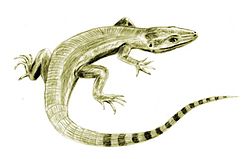Archaeothyris
|
Archaeothyris Temporal range: Late Carboniferous, 306 Ma |
|
|---|---|
 |
|
| Life restoration of Archaeothyris | |
| Scientific classification | |
| Kingdom: | Animalia |
| Phylum: | Chordata |
| Family: | †Ophiacodontidae |
| Genus: |
†Archaeothyris Reisz, 1972 |
| Type species | |
|
†Archaeothyris florensis Reisz, 1972 |
|
Archaeothyris is an extinct genus of ophiacodontid synapsid that lived during the Late Carboniferous and is known from Nova Scotia. Dated to 306 million years ago, Archaeothyris, along with a more poorly known synapsid called Echinerpeton, are the oldest undisputed synapsids known. also from Nova Scotia is slightly older but is known by very fragmentary materials.
As a living creature Archaeothyris looked like a modern-day lizard, although at 50 centimetres (20 in) long, it was one of the larger carnivores that were scurrying around the carboniferous forests.
It was also more advanced than the early sauropsids, having strong jaws that could open wider than those of the early reptiles. While its sharp teeth were all of the same shape, it did possess a pair of enlarged canines, suggesting that it was a carnivore.
Archaeothyris belonged to the family Ophiacodontidae, a group of early pelycosaurs that evolved early in the Late Carboniferous. It was one of the earliest and most basal synapsids (the group which include mammals).
Below is a cladogram modified from the analysis of Benson (2012):
Captorhinus spp.
...
Wikipedia
